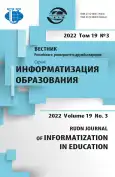The use of interactive game simulators for the development of algorithmic thinking of students in Russian language and literature lessons
- Autores: Novoselova S.Y.1, Smerechinskaya N.M.1
-
Afiliações:
- Peoples’ Friendship University of Russia (RUDN University)
- Edição: Volume 19, Nº 3 (2022)
- Páginas: 183-195
- Seção: PEDAGOGY AND DIDACTICS IN INFORMATIZATION
- URL: https://journal-vniispk.ru/2312-8631/article/view/321302
- DOI: https://doi.org/10.22363/2312-8631-2022-19-3-183-195
- ID: 321302
Citar
Texto integral
Resumo
Problem and goal . The model of formation of competitive qualities of a graduate of a modern digital school assumes that he has a culture of thinking, the ability to generalize, analyze, perceive information, set goals and choose ways to achieve it. The development of relevant skills is actively taking place in the lessons of computer science, mathematics, physics, chemistry. However, the Russian language and literature have a certain didactic potential for the formation of the ability to perform mental operations, choosing the optimal way to achieve the goal, etc. The expediency of using interactive simulators to support the communicative activity of students in the study of the Russian language and literature in order to form algorithmic thinking is substantiated. Metodology. The possibilities of designers of interactive simulators for various purposes are analyzed: for the development of online games (Lingo Play, Kid Mama), quests (Learnis), mobile phones (Alice's Resort, Kotovasia), for creating puzzles, charades, crosswords, metagrams and puzzles with riddles, quizzes. To evaluate the input conditions, testing was used, including blocks on the Russian language, literature, and computer science. The experimental study was conducted in the MOE Secondary School No. 25 of Sochi named after Hero of the Soviet Union S.E. Voitenko at the lessons of Russian language, literature, computer science. The participants of the experiment were 46 schoolchildren from the sixth grades. To create interactive game simulators in the classroom, the online designer of “eTrenics” is used (services “Kokla,” “Krypton,” “Morphanki,” “UFO,” “Potato”). Statistical processing of the results was performed using Pearson's chi-square test. Results. Students study services for creating interactive game simulators, use them to process new words, memorize spelling rules, and the plot of works of art. Statistically significant differences in the qualitative changes that occurred in the system according to the levels of development of algorithmic thinking were revealed. Conclusion. Described the features of the presented version of the use of interactive game simulators for the development of algorithmic thinking of schoolchildren in Russian language and literature lessons: inter-network interaction, the design of simulators according to the rules of the Russian language or the plot of the work, the intensification of learning, taking into account the specifics of the “clip” thinking of adolescents.
Sobre autores
Svetlana Novoselova
Peoples’ Friendship University of Russia (RUDN University)
Autor responsável pela correspondência
Email: novoselovaapk@mail.ru
ORCID ID: 0000-0002-2289-6878
Doctor of Pedagogical Sciences, Associate Professor, Professor of the Department of the Russian Language and Methods of its Teaching
32 Kuibysheva St, Sochi, 354341, RussiaNarine Smerechinskaya
Peoples’ Friendship University of Russia (RUDN University)
Email: mss.narine@gmail.com
ORCID ID: 0000-0002-3467-3604
Сandidate of Philology, Head of the Department of the Russian Language and Methods of its Teaching
32 Kuibysheva St, Sochi, 354341, RussiaBibliografia
- Ortega-Martín JL, Portnova T, Zurita-Ortega F, Ubago-Jiménez JL. Correlation between the need for cognitive closure and narrative creativity in secondary education. International Journal of Environmental Research and Public Health. 2021;18(8):4333. http://doi.org/10.3390/ijerph18084333
- Sorokin PS, Vyatskaya YA. International expert agenda in education: key characteristics and problem areas. The Education and Science Journal. 2022;24(1):11-52. http://doi.org/10.17853/1994-5639-2022-1-11-52
- Silva DB, Aguiar RDL, Dvconlo DS, Silla CN. Recent studies about teaching algorithms (CS1) and data structures (CS2) for computer science students. 2019 IEEE Frontiers in Education Conference. http://doi.org/10.1109/FIE43999.2019.9028702
- Pushkareva TP, Stepanova TA, Kalinina VV. Didactic means of developing algorithmic style of thinking of students. Education and Science. 2017;19(9):126-143. (In Russ.) http://doi.org/17853/1994-5639-2017-9-126-143
- Arkhipova EV. “Clip thinking” and axiological problems of assimilation of native speech by students in Russian language lessons. Cognitive-Communicative Approach in Teaching Russian Language and Literature at School and University: Collection of Scientific Articles and Methodological Recommendations based on the Materials of the All-Russian Scientific and Practical Conference. Ivanovo; 2019. p. 7-11. (In Russ.) Available from: https://elibrary.ru/item.asp?id=41417333 (accessed: 25.04.2022).
- Soboleva EV, Suvorova TN, Grinshkun AV, Bocharov MI. Applying gamification in learning the basics of algorithmization and programming to improve the quality of students' educational results. European Journal of Contemporary Education. 2021;10(4): 987-1002. http://doi.org/10.13187/ejced.2021.4.987
- Veretnova YuA. Methods of teaching students of grades 6-7 disciplines of the artistic and aesthetic cycle based on an algorithmic approach. Bulletin of the Krasnoyarsk State Pedagogical University named after V.P. Astafyev. 2018;43(1):190-198. (In Russ.) http://doi.org/10.25146/1995-0861-2018-43-1-52
- Kane BD, Keene KC, Reynolds S. Collaborative literary reasoning as a support for preservice English language arts teachers' learning about disciplinary literacy. English Teaching. 2022;21(1):84-97. http://doi.org/10.1108/ETPC-06-2021-0065
- Zhang J, Wang C, Muthu A, Varatharaju VM. Computer multimedia assisted language and literature teaching using heuristic hidden Markov model and statistical language model. Computers and Electrical Engineering. 2022;98:107715. http://doi.org/10.1016/j.compeleceng.2022.107715
- Parunina LV, Babikova AV. V.V. Voskobovich's games as a means of developing algorithmic thinking of preschoolers. Education and Training of Young Children. 2020;8:371-372. Available from: https://elibrary.ru/item.asp?id=46223646 (accessed: 26.04.2022). Парунина Л.В., Бабикова А.В. Игры В.В. Воскобовича как средство развития алгоритмического мышления дошкольников // Воспитание и обучение детей младшего возраста. 2020. Т. 8. С. 371-372. URL: https://elibrary.ru/item.asp?id=46223646 (дата обращения: 26.04.2022).
- Zlobina IS, Rezepova NV, Utkina NV, Sergeeva NA, Rubleva OS. The impact of interactive game resources on enhancing students’ terminological competence and foreign language proficiency. Science for Education Today. 2020;10(3):144-163. http://doi.org/10.15293/2658-6762.2003.08
- Barac R, Bialystok E, Castro DC, Sanchez M. The cognitive development of young dual language learners: a critical review. Early Childhood Research Quarterly. 2014; 29(4):699-714. http://doi.org/10.1016/j.ecresq.2014.02.003
- Whitfield A. Unspoken assumptions, deep holes and boundless expectations the dialogical tensions in teaching short stories. Language and Dialogue. 2022;12(1):110-129. http://doi.org/10.1075/ld.00114.whi
- McConn ML, Blaine AM. Literature in the standards paradigm: an evolution of gains and losses. Educational Policy. 2022;36(2):312-342. http://doi.org/10.1177/0895904819879440
- Tucker A. Reading texts, reading people: cognitive literary science and pedagogy. Arts and Humanities in Higher Education. 2022;21(1):94-110. http://doi.org/10.1177/14740222211013757
Arquivos suplementares









